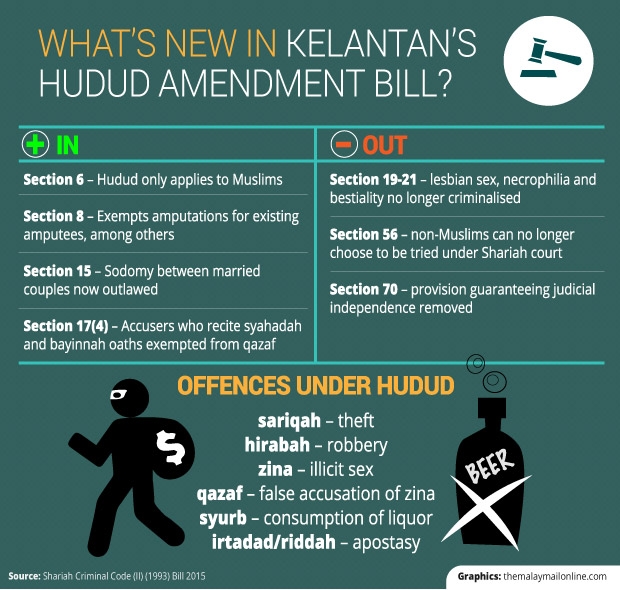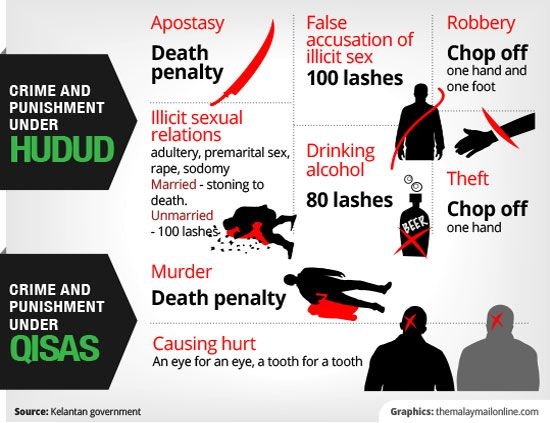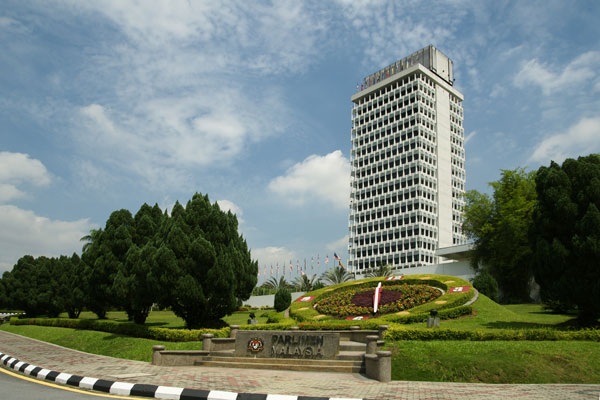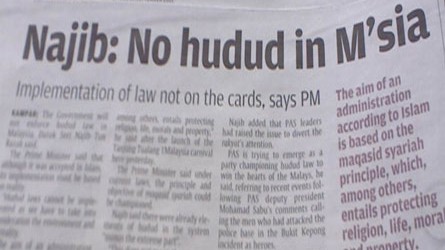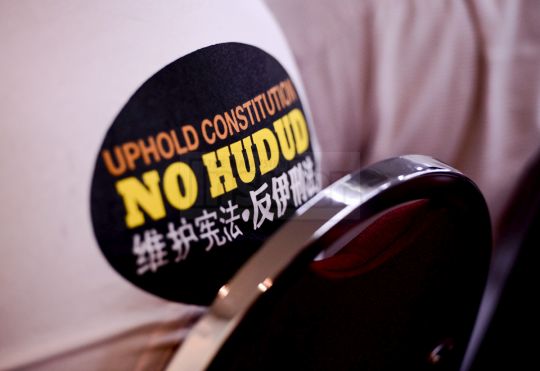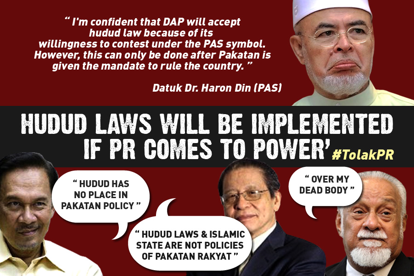13 Answers To Help You Understand How The Hudud Controversy Affects You
From what is hudud law to why PAS wants it so much, everything you need to know about the controversial new law that has Malaysia walking on egg shells.
1. What is hudud?
To put it simply, hudud is the penal laws of Islam based on the Quran and Hadiths (sayings of the prophet). It is defined as "crimes against Allah". Hudud literally means limit or restriction ordained by Allah.
It falls within the broader Shariah law, the Islamic criminal code that prescribes how Muslims should best conduct their lives. This includes religious crimes of adultery, fornication, homosexuality, robbery and such.
Hudud law triggers a class of punishment that are fixed by Allah. These range from public lashing, death by stoning and amputation of limbs as the maximum punishment for crimes. However, it is important to note that these are uncommon in most Muslim nations except for countries like Saudi Arabia and Iran that follow the strictest interpretation of Sharia.
2. What are some of the offences introduced in Kelantan under the newly tabled hudud law?
PAS has had the intention to implement hudud in Kelantan since the enactment of the Syariah Criminal Code in 1993. Here are some of the laws that were tabled on 18 March 2015:
3. News reports say the proposed hudud law now decriminalises lesbian sex, necrophilia, and bestiality. Is it true?
After the proposed amendments were tabled, it was reported that Sections 19 to 21 in the previous enactment are being struck out, therefore offences such as lesbianism, necrophilia and bestiality were removed and no longer considered a crime. However, it is not so.
According to PAS Member of Parliament Khalid Saman, "no religion would make offences, especially bestiality and necrophilia, permissible."
"Any claims saying the we are removing Section 19 to 21 which laid down the said offences are not true. We are not creating a new Enactment, we are amending it by adding hudud and qisas. To put it simply, lesbian sex is considered an offence," said Nik Bahrum Nik Abdullah, a member of the Kelantan Syariah Criminal Code (II) Technical Committee.
4. Why is PAS so bullish in tabling hudud in Kelantan despite opposition from DAP and PKR?
Firstly, the hudud law resonates with the religious foundations of PAS, an Islamist political party.
As PAS is the smallest party in Pakatan Rakyat, its conservative ulama (clergy) sees it as a platform to invigorate the party and gain a greater influence within the party by gaining trust of Malay voters. The infighting could also create an opportunity for them to join forces with Umno or Barisan Nasional, a move that would further extend their power in the country.
5. Why is UMNO supporting its rival PAS in implementing hudud?
According to The Malay Mail Online, political analysts believe Umno is openly backing its rival's controversial plan for two strategic reasons:
1. It further drives a wedge between Pakatan Rakyat. The opposition has been growing stronger with voters yet the issue of hudud has threatened to break them apart.
2. It distracts voters from Putrajaya's painful policies, especially at a time when the implementation of GST will make Barisan Nasional unpopular with voters. It was Umno minister Datuk Seri Jamil Khir Baharom who proposed for PAS to table the private member’s bills in Parliament for Kelantan to enforce the Islamic penal code the same week GST Act takes effect.
Meanwhile, MCA has threatened to severe ties with the party if Umno supports the bill at the federal level.
6. Why are people supporting it?
A portion of Muslims in the country support the hudud law as it is the law of Allah. Kelantan state executive councillor Nasaruddin Daud says it is their religious right to practice Islamic teachings. As for the harsh punishments, he says those who are against hudud were sympathising with thieves and not the victims. They believe "hudud is not to punish, but to deter criminals."
7. Why are people against it? What are the debates surrounding the law?
In this article, Raja Petra Kamaruddin explains that the debate on hudud is not about introducing Islamic laws in Malaysia, but about making the laws complete. Islamic laws already exist in Malaysia in the form of the Sharia court, but the hudud branch of Sharia law is not covered in Malaysia yet.
The law is viewed as unconstitutional, discriminatory, and divisive. “The enactment goes against the secular structure of our Federal Constitution, which does not envisage a theocratic Islamic state, or a parallel criminal justice system where Muslims and non-Muslims are subjected to unequal treatment before the law,” said Malaysian Bar president Steven Thiru.
Under the Federal Constitution, equality was guaranteed for Muslims and non-Muslims under the law. The hudud law would serve differing punishment for Muslims as compared to non-Muslims.
Non-Muslims are also afraid that they would be eventually subjected to the Islamic laws, especially during a time when reports of increasing attempts to impose the religion on non-Muslims have caused anxiety.
8. What is going on in Kelantan?
PAS is seeking to amend the Syariah Courts Act to extend the maximum sentence allowed, before seeking permission for Kelantan to implement its own criminal justice system.
On 19 March 2015, PAS tabled an amendent for the Kelantan Syariah Criminal Code (II) Enactment 1993 which forms the basis of hudud law in the state. It was passed unanimously by the State Legislative Assembly.
PAS now plans to put forward two private members’ bills in Parliament to enable Kelantan to enforce hudud ― one will seek approval for the state to legislate punishment for crimes under the Penal Code.
The other seeks to amend the Shariah Courts (Criminal) Jurisdiction Act 1965 to enable Islamic courts to mete out punishments like the death penalty for apostasy and amputation of limbs for theft.
9. Will Parliament allow the hudud law to be implemented?
For the hudud law to be enforced in Malaysia, the federal government must first amend the Federal Constitution. The constitution is clear that the jurisdiction on criminal punishments lay with the civil courts, not the Syariah courts. If there are discrepancies between the civil law and the Islamic law, hudud cannot come into effect. It is unconstitutional.
At the juncture, all it takes for PAS to implement the hudud law is a simple majority in Parliament to change an act in the Federal Constitution. However on 25 March, The Malaysian Insider reports that the Conference of Malay Rulers has rejected the proposed amendments to the Syariah Court Act. This means the federal government cannot table the bill in Parliament anymore. This explains why PAS president Datuk Seri Hadi Awang tabled it as a private member's bill.
There is now the question as to whether Hadi's private member's bill will see the light of day, given that government matters usually take priority on the Dewan Rakyat's agenda. Law minister Nancy Shukri has said that the bill will likely not be raised in the current parliamentary sitting which ends on April 9 as the agenda has already been filled.
Update: The Keeper of the Rulers' Seal has denied The Malaysian Insider report that the Conference of Rulers had rejected the proposed Syariah Court Act amendments. A police report had been made against TMI resulting in the arrest of four editors and a director from the news portal. Full story here.
10. What is the Prime Minister's stand on the issue?
A September 2011 report of Najib rejecting the notion of hudud in Malaysia on The Star newspaper.
Image via rakyattimes.comNajib is caught between supporting the implementation of hudud to appease his Malay voters, and to maintain the spirit of the Federal Constitution.
In September 2011, the PM said that the government will not enforce hudud in Malaysia. "Hudud laws cannot be implemented as we have to take into consideration the environment and the reality."
In April 2014 after GE13, his stance changed, saying that the government has never rejected the implementation hudud.
Tension is rising in the air as PAS gets one step closer to tabling the law in Parliament, but Najib is remaining silent on the matter. Malaysia and the opposition are waiting for him to voice his and Barisan Nasional's statement on the dividing issue.
Analysts say he is keeping mum to let the opposition crumble under their own weight.
11. How will this affect non-muslims in Malaysia?
"In a multi-racial and multi-religious country like Malaysia, hudud will impact the non-Muslims as well, whatever the assurances given so far," writes veteran journalist Wong Chun Wai.
Evidently, the Kelantan government has retained 3 dubious clauses in the amended Shariah Criminal Code (1993) that could subject non-Muslims to the contentious Islamic penal law. According to Malay Mail Online, the bill retained Clause 56, 57 and 58 under the “General” supplementary that provides for hudud and ta'zir (discretionary) punishments for anyone who conspires, plots, abets or assists in the act of a crime."
Kelantan Mentri Besar Datuk Ahmad Yaakob now says that code has been amended and now the hudud law cannot be applied to non-Muslims. Previously, non-Muslims are given an option to choose hudud or to be tried under conventional laws.
12. What will happen to Pakatan Rakyat now?
PAS' headstrong determination to implement hudud in Kelantan despite disagreements from its party members have threatened to break up the party. On 24 March 2015, DAP announced their decision to end all ties with PAS.
DAP claims that PAS leader Hadi Awang has betrayed the Pakatan Rakyat by tabling the bill without presenting it to the PAS Central Committee and PR Leadership Council. They also claimed Umno had instigated PAS to implement the law in Parliament by promising federal government support.
DAP will meet with the PKR leadership to discuss future course of Pakatan Rakyat.
13. What will happen to Malaysia if PAS successfully enforces hudud?
Malaysian Bar president Steven Thiru says that if the hudud law is brought into the criminal justice system, it would result in the importation of Islamic penal law into a secular system. This would result in a rewriting of the Federal Constitution.
If the Islamic code gets the green light, there are fears that it would further widen the religious polarisation in the country. G25, the group of retired high-ranking Malaysian civil servant says it would be Malaysia's signal to world that it has chose to abandon the path of moderation.


